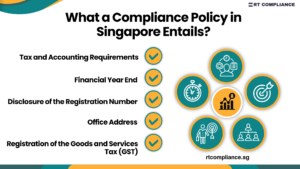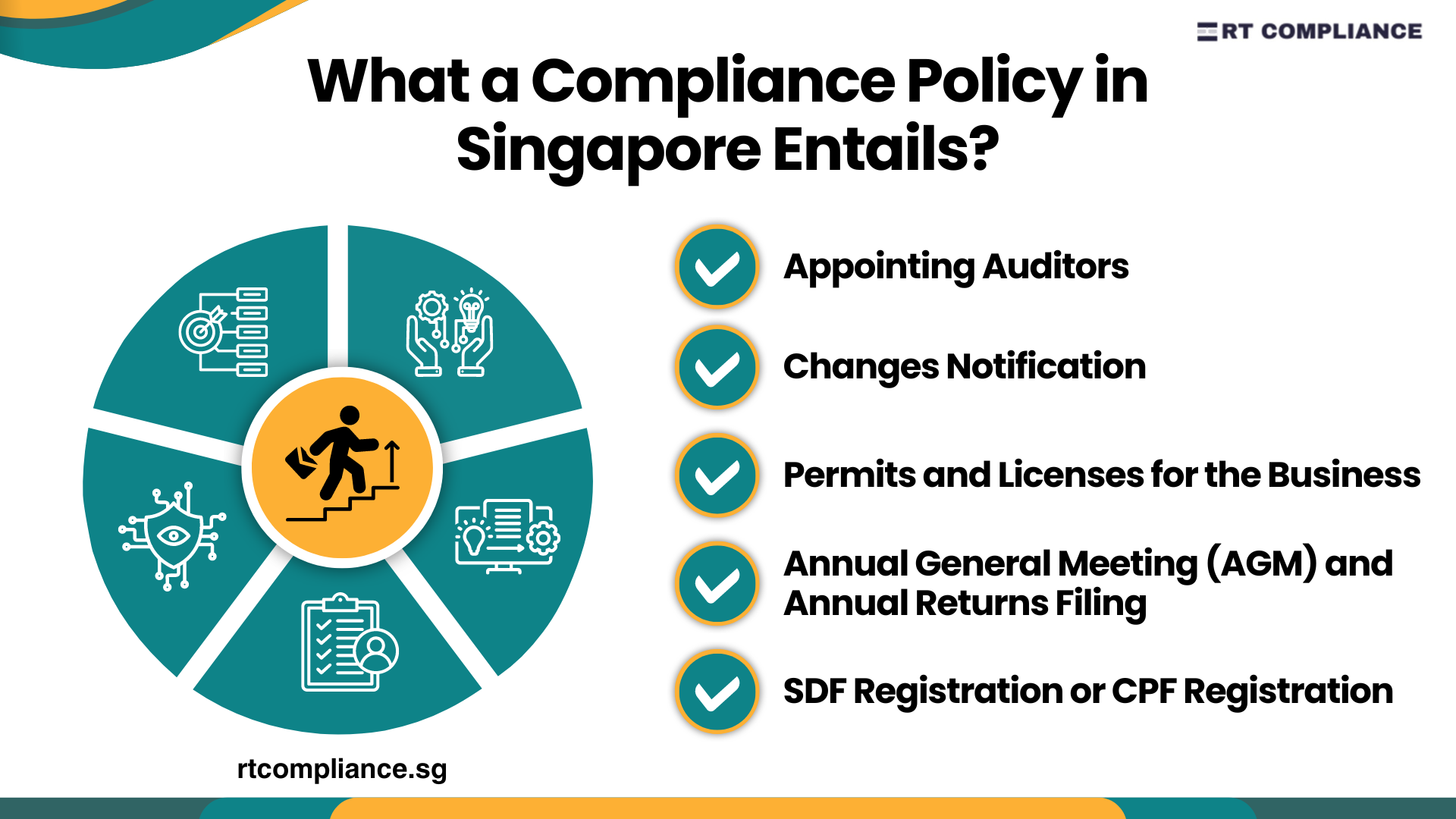What is a Compliance Policy? Your Essential Guide for Singapore Businesses.
Singapore is renowned for its transparent legal system and robust business compliance policy. A compliance policy is a crucial set of rules, statutory regulations, and legal standards that guide businesses in adhering to Singapore’s Companies Act, industry-specific laws, and ethical practices. These corporate compliance policies in Singapore serve as a framework to ensure companies uphold proper governance and legal obligations. Do you know what a compliance policy is? If no, then worry no more. A compliance policy is a combination of statutory rules, regulations, laws, and standards laid down by a country. Companies are obliged to comply, and the legal system is ready to act upon those defying them. These obligations are in Singapore’s Companies Act, and they guide the interested parties in their operations.
Purpose of a Compliance Policy and Its Importance in Singapore
Compliance policy intends to supply organizations with a structured approach, which guarantees the companies’ adherence to legal, financial, and ethical standards. And a clearly established corporate compliance policy helps to reduce the risks, including the legal penalties, financial losses, reputational damage, and disruptions of the operations. It creates a clear bottom line for employees, management, and stakeholders on ethical conduct and development of a culture of integrity in the organization.
Another key benefit of operational consistency is another one. When internal procedures and regulatory requirements are aligned the companies are in a better position to handle audits, adjudicate the disputes and proceed to scale responsibly. Compliance policies also provide for reporting requirements, internal controls, sanctions, which provide for long term stability and trust.
In Singapore, a proper business compliance policy is not only helpful – it is necessary. The country has a strict regulatory environment enforced by institutions including, Monetary Authority of Singapore (MAS), Accounting and Corporate Regulatory Authority (ACRA), Personal Data Protection Commission (PDPC) and Inland Revenue Authority of Singapore (IRAS). Companies have to adhere to Companies Act, Personal Data Protection Act (PDPA), and industry-specific guidelines.
Not fulfilling these requirements may result in severe non-compliance punishment such as fines, or licenses suspension or even legal action. The determination of businesses operating in Singapore to adhere to laws and promote transparency is demonstrated through the implementation and enforcement of strong regulatory compliance policy, which opens the door for a reputable and sustainable success as well as experience of confidence among investors.
Types of Compliance Policies Every Singapore Business Should Consider
Any business in Singapore, including small and big businesses and businesses belonging to different industries, should adopt a set of compliance policy to comply with regulations and run ethical, risk-conscious businesses. It is crucial to understanding the types of compliance policies to achieve sustainable and legal safeties long-term.
1. Regulatory Compliance Policy
This enunciates the way a firm would ensure it adheres to imposed laws and regulations by such bodies as MAS, ACRA, IRAS and PDPC. It makes it compliant with Singapore Companies Act, PDPA and tax laws.
2. Employee Compliance Policy
This regulates how employees behave, how to conduct oneself, anti-discrimination guidelines, and disciplinary measures to make the work a place to feel safe and comfortable.
3. Data Protection and Privacy Policy
Having the PDPA in place, companies cannot afford to ignore clear guidelines to follow when collecting, storing, and processing personal data to prevent violations of data protection compliance.
4. Anti-Bribery and Corruption Policy
Aids to prevent unethical practices especially important for the companies involved in international trade or government contacts.
5. Whistleblower Policy
Stimulates employees to report acts of misconduct without any possibility of being identified, reaffirming transparency and accountability.
6. Conflict of Interest Policy
Makes sure that a decision process is still impartial and represents the interests of the company.
Through such compliance policy types, the Singaporeian businesses not only satisfy the requirements of the legislation but also reinforce their corporate governance and image.
Key Elements of a Corporate Compliance Policy in Singapore
A compliance policy differs from one country to the other. Here are details of the dos, when, and who to do them to be compliant in Singapore.
- Tax and Accounting Requirements
The company should submit particular documents annually to IRAS. They include a financial report, tax returns, accounting records, and estimated chargeable incomes.
- Financial Year End
Companies must mark the end of their financial years. Subsidiaries of a particular company and their parent firm should share a financial year’s end to prepare their accounts reports easily.
- Disclosure of the Registration Number
ACRA issues a unique entity number to a new organization upon registration. It shouldn’t be omitted in official invoices, audited accounts, business letters, or when corresponding to government authorities officially.
- Office Address
It should be local and not a P.O. Box. The regular working hours are 9:00 a.m. to 5:00 p.m., and the company should open for at least 3 hours daily. Businesses can operate outside the regular hours but only if they have a valid reason. Under such circumstances, they should notify ACRA about their operational hours.
- Registration of the Goods and Services Tax (GST)
You should pay it as long as you are supplying goods or services within the boundaries of Singapore. It is also applicable when importing goods into the country. However, it only applies to a company with yearly taxable revenue of over S$1 million or is expected to exceed that figure.
- Appointing Auditors
The appointment of an auditor should happen not later than three months after the incorporation date. However, it is not applicable if the individual shareholders are below twenty. If not a single shareholder is a corporation, the appointment is also unnecessary. The same case applies when the firm’s annual turnover is below S$5 million.
- Changes Notification
Notify ACRA upon nominating a secretary or director among other officers as soon as it happens. In case share capital increases or decreases, do the same. Transfer of shares and resignation of officers should also be reported to ACRA.
- Permits and Licenses for the Business
As long as your business falls under categories that have to apply for licenses, the compliance policy demands that you do so.
- Annual General Meeting (AGM) and Annual Returns Filing
A new company should hold its first AGM not more than 18 months since its existence. As for the existing ones, it should be within 15 months from the last one. Another option is once per calendar year, and it should choose the option that gives the earliest date. After the AGM, annual returns filing should be done with the ACRA within a month.
- SDF Registration or CPF Registration
The Central Provident Fund applies to Singapore citizens or foreigners residing there permanently. It is a pension fund, and both parties, employees and employers, contribute depending on the monthly salary. It is mandatory as long as the pay is over $50. On the other hand, Skills Development Fund is for people with employment passes and work passes.
How to Develop and Implement a Compliance Policy in Singapore: A Step-by-Step Guide
It is important for businesses in Singapore to have a strong compliance policy in order to comply with the rules and set ethical standards. The following is a step by step guide for helping companies to put an effective compliance policy framework.
Assess Regulatory Requirements
Start by examining all applicable laws and regulations that relate to your industry-the ones enforced by MAS, ACRA, PDPC, and IRAS. Learn about the exact compliance requirements by Companies Act and other regulations in Singapore.
Define Policy Objectives
Clearly define the goal of the policy- whether to avoid legal risks, enhance ethical practices, or have operational homogeneity.
Draft the Policy Document
Prepare elaborate guidelines outlining roles and responsibilities, reporting, employees conduct, data protection as well as disciplinary actions. Employ simple, direct language that is easily understood by all level of persons.
Communicate and Train
Provide all employees with the policy and hold training sessions to ensure that they are aware and implement properly.
Monitor and Review
Set continuous monitoring and periodic reviews to update the policy according to the evolving laws and business acts.
Following the above steps, Singapore companies can successfully adopt the compliance policies that ensure that their operations are secure while growing confidence from stakeholders.
Final Words
No company can afford to ignore the compliance policy of the state it operates in, and Singapore is no exception. After all, failure to comply would see the firm incur penalties and fines. Why wait for that when it is avoidable?






